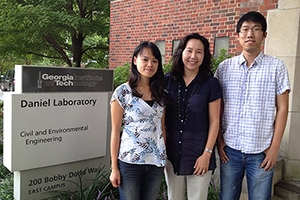
The Society of Environmental Toxicology and Chemistry has named Ching-Hua Huang its 2014 North American Chemist.
The award means Huang, a professor in the School of Civil and Environmental Engineering, will travel with two of her students to Vancouver in November to present their research at the society’s annual meeting.
More from the SETAC Globe:
The winner of the 2014 SETAC North America Chemist Award is Ching-Hua Huang, a professor at the School of Civil and Environmental Engineering at the Georgia Institute of Technology. This award of the SETAC North America Chemistry Advisory Group (CAG) brings environmental chemists and some of their students, which are new to SETAC, to the annual meeting to present their work.
Huang has been leading an active environmental chemistry research program for more than 14 years. In particular, she has conducted extensive research on the environmental fate and transformation mechanisms of emerging contaminants such as pharmaceuticals and endocrine disruptors as well as the development of advanced treatment technologies for mitigation of these micropollutants. In addition, she has been actively involved in other topics including the formation and control of emerging disinfection byproducts in water and food as well as remediation of heavy metals in energy production wastes. “I am quite honored to be selected for the 2014 SETAC North America Chemist Award,” Huang noted and continued, "I look forward to interacting with SETAC scientists and members at the upcoming meeting.”
At the Vancouver meeting, she will present a study on the interactions of tetracycline antibiotics with Fe(II)/Fe(III) ions and the induced transformation reactions for both the organic and metal species, which have significant implications for their environmental fate. Peizhe Sun, a former doctoral student and current postdoc in her group, has devoted his thesis on the transformation of veterinary ionophore antibiotics under conditions related to water–soil–litter systems. Peizhe will present his study on the biodegradation of ionophore antibiotics in broiler litter and soil. Wan-Ning Lee, a second-year doctoral student in her group, will present two posters — one on the analytical method development for multi-classes of disinfection by-products in water and produce, and the other on the persistence and phototransformation toxicity of ketamine and norketamine in hospital wastewater and surface water.

